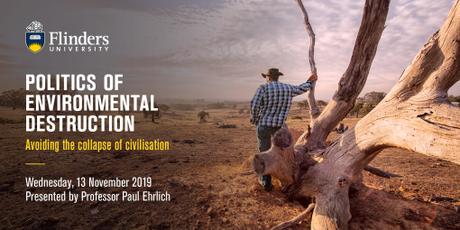
You’d think I’d get tired of this, wouldn’t you? Alas, the fight does wear me down, but I must persist.
My good friend and colleague, the legendary Professor Paul Ehrlich of Stanford University, as well as his equally legendary wife, Anne, will be joining us in Adelaide for a brief visit during their annual southern migration.
Apart from just catching up over a few good bottles of wine (oh, do those two enjoy fine wines!), we have the immense privilege of having Paul appear at two events while he’s in town.
I’m really only going to be talking about the second of the two events (the first is a Science Meets Parliament gig with me and many others at the South Australia Parliament on 12 November): a grand, public lecture and Q&A session held at Flinders University on Wednesday, 13 November.
Haven’t heard of Paul? Where have you been hiding? If by some miracle you haven’t, here’s a brief bio:
Paul Ehrlich is Bing Professor of Population Studies Emeritus, President of the Center for Conservation Biology, Department of Biology, Stanford University and Adjunct Professor, University of Technology, Sydney. He does research in population biology (includes ecology, evolutionary biology, behavior, and human ecology and cultural evolution). Ehrlich has carried out field, laboratory and theoretical research on a wide array of problems ranging from the dynamics and genetics of insect populations, studies of the ecological and evolutionary interactions of plants and herbivores, and the behavioral ecology of birds and reef fishes, to experimental studies of the effects of crowding on human beings and studies of cultural evolution, especially the evolution of norms. He is President of the Millennium Alliance for Humanity and the Biosphere and is author and coauthor of more than 1100 scientific papers and articles in the popular press and over 40 books. He is best known to his efforts to alert the public to the many intertwined drivers that are pushing humanity toward a collapse of civilization – especially overpopulation, overconsumption by the rich, and lack of economic, racial, and gender equity. Ehrlich is a Fellow of the American Academy of Arts and Sciences, the American Entomological Society and the Beijer Institute of Ecological Economics, and a member of the United States National Academy of Sciences and the American Philosophical Society. He is a Foreign Member of the Royal Society, an Honorary Member of the British Ecological Society and an Honorary Fellow of the Royal Entomological Society. Among his many other honours are the Royal Swedish Academy of Sciences, Crafoord Prize in Population Biology and the Conservation of Biological Diversity (an explicit replacement for the Nobel Prize); a MacArthur Prize Fellowship; the Volvo Environment Prize; UNEP Sasakawa Environment Prize; the Heinz Award for the Environment; the Tyler Prize for Environmental Achievement; the Heineken Prize for Environmental Sciences; the Blue Planet Prize; the Eminent Ecologist award of the Ecological Society of America, the Margalef Prize in Ecology and Environmental Sciences, and the BBVA Frontiers of Knowledge Award in Ecology and Conservation Biology. Prof Ehrlich has appeared as a guest on more than 1000 TV and radio programs; he also was a correspondent for NBC News. He has given many hundreds of public lectures in the past 50 years.
I hope your jaw just dropped.
Paul will be speaking on the politics of environmental destruction, as well as the things scientists and citizens can do to slow the relentless decline into collapse (both biological and societal). A summary of his talk follows:
Climate disruption, the destruction of biodiversity, global toxification, and escalating chances of a large-scale nuclear war, are some of today’s existential threats to human civilization. The situation is so critical that engagement by the broadest possible representation of the human population should be involved in all aspects of political decision-making. Yet, environmental politics across the world are increasingly noxious and ineffective. Beyond being outdated, traditional norms that scientists should limit their contributions to public discourse to telling the ‘facts’, and not give their own opinions, is now downright dangerous. Scientists must re-examine their behavior and practices to fit them into the context of an alarming rate of environmental decline — this includes how to communicate to the wider public and their elected officials about the degree of scientific consensus on the extinction and other crises unfolding. Scientists, like all citizens, should always engage decision makers to pay attention to the main factor pushing civilization toward a collapse — the increasing scale of the human enterprise.
I’m also pleased that we have a star-studded panel composed entirely of women that will follow Paul’s lecture. We are fortunate that the Chief Scientist of South Australia, Professor Caroline McMillen, Professor Karen Burke Da Silva of Flinders University, and Dr Susannah Eliott of the Australian Science Media Centre will field questions and stimulate discussion. The event will be hosted by Associate Professor Paul Willis, palaeontologist, train-nut, former presenter on ABC’s Catalyst, former Director of the Royal Institution of Australia, and now Director of his own company, Media Engagement Services.
It’ll be a great evening, attended by journalists, academics, politicians and the general public. Afterwards, we have a cosy private dinner for about 20 of Adelaide’s ‘thought leaders’ working in the environment-politics interface (unfortunately I cannot invite all of you).
So, if you plan to be in Adelaide, or would like to come to this free event, please register here. You won’t be disappointed.
CJA Bradshaw

